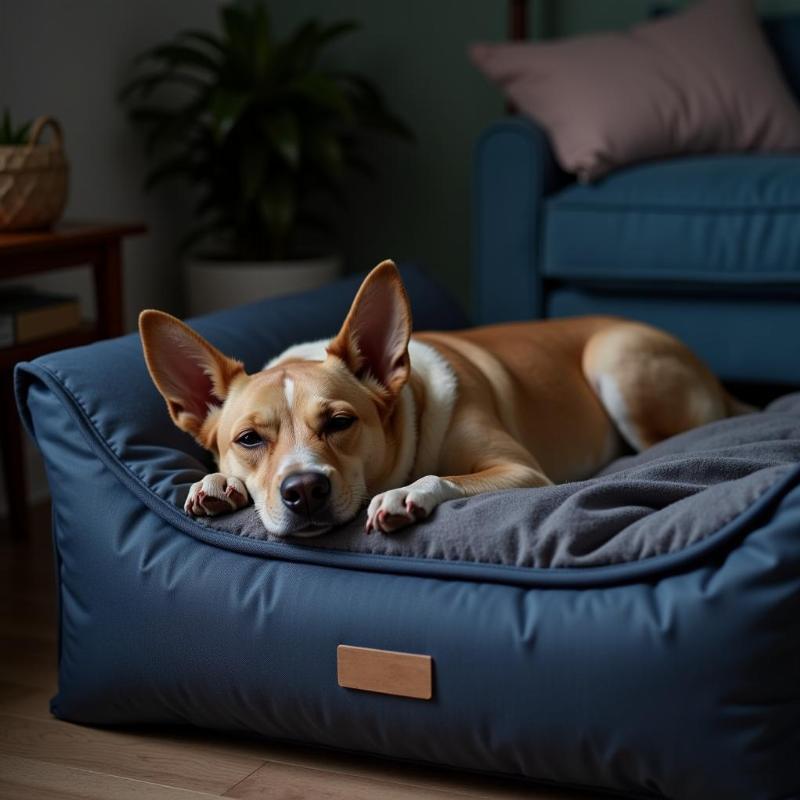If you’ve noticed your old dog pants at night, you’re not alone. Many senior dogs experience increased panting, especially during the evening hours. While some panting is normal, excessive panting can be a sign of an underlying health issue. This article will explore the common reasons why older dogs pant at night, offer practical tips for managing it, and help you determine when it’s time to seek veterinary care.
Why Does My Old Dog Pant So Much at Night?
Several factors can contribute to increased panting in senior dogs, ranging from normal age-related changes to more serious medical conditions. Understanding these potential causes can help you provide the best possible care for your furry companion.
Pain and Discomfort
As dogs age, they’re more prone to conditions like arthritis and other joint issues. This pain can be exacerbated at night, leading to increased panting. Other sources of discomfort, like digestive upset or even a full bladder, can also cause panting.
Cognitive Decline
Cognitive Dysfunction Syndrome (CDS), similar to dementia in humans, can affect senior dogs. This can cause anxiety and confusion, particularly at night, leading to increased panting. Changes in their familiar environment, like rearranged furniture, can also trigger anxiety and panting.
Heart and Lung Issues
Heart and lung problems can make it difficult for older dogs to breathe efficiently, leading to panting, especially when lying down. Conditions like congestive heart failure and chronic bronchitis are more common in senior dogs.
Medications
Certain medications can have panting as a side effect. If your senior dog recently started a new medication and you notice increased panting, consult your veterinarian.
Temperature Regulation
Older dogs may have difficulty regulating their body temperature, making them more sensitive to heat. Even a slightly warm room can cause them to pant excessively at night.
Managing Your Old Dog’s Nighttime Panting
If your senior dog is panting heavily at night, there are several things you can do to help them feel more comfortable:
- Provide a Comfortable Sleeping Area: A supportive orthopedic bed can help alleviate joint pain and improve sleep quality. Ensure the bed is in a quiet, cool area of the house.
- Maintain a Cool Temperature: Keep the room temperature comfortable, especially during warmer months. A fan or air conditioning can help.
- Establish a Routine: A consistent bedtime routine can help reduce anxiety and promote relaxation. This could include a short walk, a gentle massage, or a quiet cuddle.
- Consider Calming Aids: Pheromone diffusers, calming supplements, or anxiety vests can help reduce stress and anxiety. Consult your veterinarian before using any new supplements or medications.
 Senior Dog in a Comfortable Bed
Senior Dog in a Comfortable Bed
When to Seek Veterinary Care
While some panting is normal, excessive or sudden panting can be a sign of a serious medical condition. Consult your veterinarian if your dog’s panting:
- Is sudden or severe
- Is accompanied by other symptoms, such as coughing, wheezing, or lethargy
- Interferes with sleep or daily activities
- Doesn’t improve with home management strategies
Conclusion
Observing your old dog pants at night can be concerning, but understanding the potential causes and implementing management strategies can significantly improve their comfort and quality of life. Don’t hesitate to contact your veterinarian if you have any concerns about your senior dog’s health.
FAQs
- Is it normal for old dogs to pant more? Some increase in panting is common in older dogs due to age-related changes, but excessive panting should be investigated.
- What can I give my old dog for pain at night? Never give your dog human medication without consulting your veterinarian. They can prescribe appropriate pain relief for your dog’s specific needs.
- Could my dog’s panting be related to anxiety? Yes, anxiety, especially at night, can cause increased panting in dogs.
- How can I tell if my dog’s panting is serious? Sudden, severe, or persistent panting, especially if accompanied by other symptoms, warrants a veterinary visit.
- What are the signs of cognitive decline in dogs? Signs include confusion, disorientation, changes in sleep patterns, increased anxiety, and changes in social interaction.
- Can a hot room make my dog pant more at night? Yes, older dogs have more difficulty regulating their body temperature and are more susceptible to heat.
- What kind of bed is best for a senior dog? Orthopedic beds provide support and cushioning for aging joints, promoting comfort and better sleep.
Related Articles
- women’s pajamas with dogs on them
- old dog coughing and wheezing
- pajamas for dogs and humans
- dog print pajamas for men
- why do old dogs pant so much
Beautdogs.us is your trusted source for comprehensive and engaging information on dog care, breeds, and lifestyle in the United States. Whether you’re a new dog owner or a seasoned expert, Beautdogs.us offers expert advice and valuable resources to help you navigate the joys and challenges of dog ownership. From breed-specific guides to health and wellness tips, we’re here to support you and your furry friend every step of the way. Contact us today for personalized advice and discover a world of valuable resources! Email: [email protected], Phone: +1 501-555-7529. Visit Beautdogs.us to learn more.